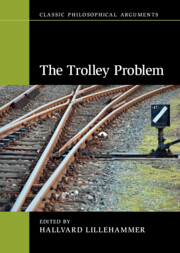Book contents
- The Trolley Problem
- Classic Philosophical Arguments
- The Trolley Problem
- Copyright page
- Contents
- Tables
- Contributors
- Acknowledgments
- Introduction
- 1 Keeping track of your trolleys
- 2 Shunted trolleys and other diversions
- 3 Must we turn the trolley?
- 4 Non-consequentialism in light of the trolley problem
- 5 Non-consequentialist principles under conditions of uncertainty
- 6 The trolley problem and the doing/allowing distinction
- 7 Virtue ethics and the trolley problem
- 8 Trolley dilemmas from the philosopher’s armchair to the psychologist’s lab
- 9 Trolleyology
- 10 Cross-cultural responses to trolley problems and their implications for moral philosophy or
- 11 Ethical accident algorithms for autonomous vehicles and the trolley problem
- 12 A new trolley problem?
- Bibliography
- Index
10 - Cross-cultural responses to trolley problems and their implications for moral philosophy or
How I learned to stop worrying and love (constructivist) relativism
Published online by Cambridge University Press: 24 February 2023
- The Trolley Problem
- Classic Philosophical Arguments
- The Trolley Problem
- Copyright page
- Contents
- Tables
- Contributors
- Acknowledgments
- Introduction
- 1 Keeping track of your trolleys
- 2 Shunted trolleys and other diversions
- 3 Must we turn the trolley?
- 4 Non-consequentialism in light of the trolley problem
- 5 Non-consequentialist principles under conditions of uncertainty
- 6 The trolley problem and the doing/allowing distinction
- 7 Virtue ethics and the trolley problem
- 8 Trolley dilemmas from the philosopher’s armchair to the psychologist’s lab
- 9 Trolleyology
- 10 Cross-cultural responses to trolley problems and their implications for moral philosophy or
- 11 Ethical accident algorithms for autonomous vehicles and the trolley problem
- 12 A new trolley problem?
- Bibliography
- Index
Summary
There has been widespread consensus amongst professional philosophers on responses to initial variants of the Trolley Problem. However, those philosophers have all been from Western, Educated, Industrialized, Rich, and Democratic societies. There is a growing literature that investigates whether judgments differ across cultures. If judgments differ, the implications for moral philosophy depend on whether this represents genuine moral disagreement and what are its causes. I survey the literature on cross-cultural variation in moral judgments in trolley problems. There is not much evidence and it is mixed. The higher acceptability of acting in Bystander compared to Footbridge is relatively consistent across cultures (small-scale societies may be an exception, but there is limited evidence); however, the level of acceptability of acting in the individual scenarios differs across cultures, especially in Footbridge. This preliminary inspection suggests that it is plausible that cross-cultural differences in judgments exist. Assessing their causes, they seem likely to be genuine moral disagreements, which result from differences in culture and institutions. This raises issues for the metaphysics and epistemology of moral judgments. If we are not to be skeptics about the existence of moral facts or the possibility of knowing them, then we may need to endorse a form of constructivist relativism.
Keywords
- Type
- Chapter
- Information
- The Trolley Problem , pp. 182 - 210Publisher: Cambridge University PressPrint publication year: 2023



